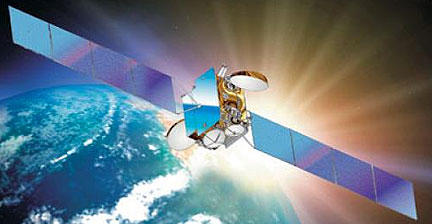
Writer Komsan Tortermvasana of the Bankok Post filed a story relating that Thaicom Plc, the country's sole satellite service provider, has now urged Prime Minister Prayut Chan-o-cha to invoke the powerful Section 44 to resolve uncertainty around the satellite business's new fee structure.

Artistic rendition of the Thaicom-5 satellite.
Prolonged uncertainty could cause the country to lose its right to use two orbital slots at 119.5 and 78.5 degrees East. The slots are used by Thaicom 4 and Thaicom 5 satellites, respectively, under a concession from the Digital Economy and Society (DE) Ministry. This expires in 2021. The company has, since early last year, been planning to hire foreign makers to build two new satellites. Thaicom 9 would replace Thaicom 4, with Thaicom 10 set to replace Thaicom 5 by 2019, said Thaicom chief executive Paiboon Panuwattanawong. However, the company suspended its plan later in 2016 after Deputy Prime Minister Prajin Juntong began studying ways of revamping the satellite industry's business structure.
ACM Prajin's move came after the cabinet said in 2016 that two more satellites —Thaicom 7 and Thaicom 8 — had to shift from the licensing system back to the concession format. This would result in an annual concession fee of 20.5 percent for both, a sharp hike from the 5.75 percent fee that Thaicom now pays. If the company launches any new satellites they would also have to adhere to the new business structure. The government said it wants the public to benefit more from the so-called space economy.
Thaicom operates three satellites under the concession system: broadband-run Thaicom 4, or iPSTAR, and broadcasting satellites Thaicom 5 and Thaicom 6. In contrast, Thaicom 7 and Thaicom 8 operate under the single-license scheme of the National Broadcasting and Telecommunications Commission (NBTC), which only requires a 5.75 percent fee.
Thaicom 7 was placed into orbit in 2012 and began operating in 2014. Thaicom 8 was launched into orbit in May 2016.
Mr. Paiboon said the company has been negotiating with government representatives since last year but agreement on the new operating fee structure has yet to be reached. "It's impossible to launch Thaicom 9 by 2019 as originally planned because building a new satellite now requires a two-year process at least," he said.
Under current regulations, a satellite service provider must apply for an operating license from the NBTC. Meanwhile, the DE Ministry has to work with the International Telecommunication Union to arrange its orbital slots.
"Orbital slots are reserved on a first-come, first-served basis. This means once the ministry reserves one, the satellite must be launched on the allotted time," Mr. Paiboon added.
Thaicom hopes the government will resolve the issue by early next year at the latest — this would allow the company to launch Thaicom 9 before the concessions on Thaicom 4 and Thaicom 5 expire in 2021.
"Satellite services could be part of the infrastructure backbone driving the government's digital economy policy," Mr Paiboon said.
Thaicom plans to allocate 30 percent of Thaicom 9's transponder capacity to CAT Telecom so it can provide services for the public, he added. He said the uncertainty surrounding the new operating fee structure for satellites has already cost Thaicom one of its major prospective customers, Softbank. Softbank rents 1.5 gigabytes of Thaicom 4's transponder capacity to provide mobile services in Japan. It appeared keen to rent 30 percent of Thaicom 9's transponder capacity earlier this year but cancelled the deal in April citing uncertainty about the satellite's launch. Mr. Paiboon said the 5.75 percent licensing fee may be the highest in the global satellite market.
ACM Prajin said earlier the government was mulling four alternative business structures for the satellite industry: a wholly state-owned formula; a shareholding structure under the terms of the 2013 Public-Private Joint Venture Act; a flexible public-private joint venture model; and a liberalized model with higher operating fees.

